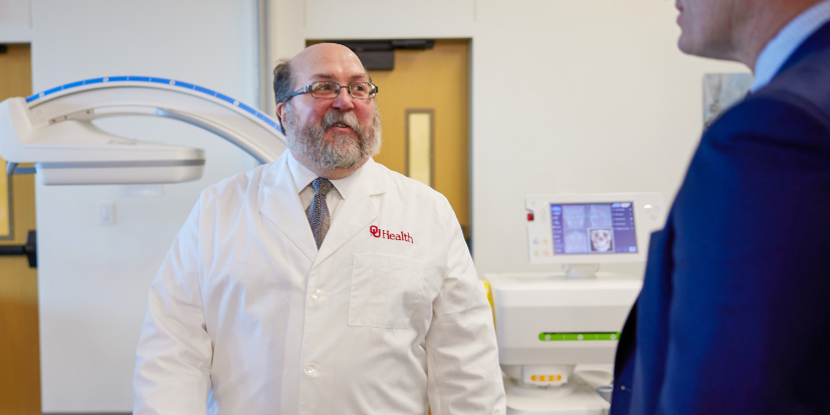Stephenson Cancer Center Researcher Awarded 1.7 Million Dollar Grant in Pancreatic Cancer Research
- Category: News, Adults Services
- Posted On:
Priyabrata Mukherjee, Ph.D., Associate Director for Translational Research at the Stephenson Cancer Center, was recently awarded a five-year, 1.7 million dollar research grant from the National Institutes of Health to investigate a potential new therapeutic target for a particularly lethal type of pancreatic cancer.
Pancreatic ductal adenocarcinoma (PDAC) is one of the most malignant types of pancreatic cancer, and it is also highly resistant to traditional therapy. According to the American Cancer Society, the current median survival rate for this type of cancer is only six months, and it has a five-year survival rate of less than 5 percent.
“For the past thirty years, advancements in treating PDAC have evaded researchers because one of its specific gene mutations, K-RAS, has proven to be resistant to most conventional therapies,” said Dr. Mukherjee. “This grant will support research that advances our understanding of a potential molecular regulator that could be developed as a new therapeutic target.”
The K-RAS mutation is prevalent in PDAC and several other cancers, causing normal cells to transform into cancerous cells. In 2013, the National Cancer Institute undertook “The RAS Initiative” to gain insight into RAS genes and their role in cancer. The goal of was to identify molecular regulators of K-RAS that can be targeted with new therapeutic strategies.
Mukherjee’s research has identified the protein UBAP2 (Ubiquitin Binding Associate) as a possible molecular regulator, or on-and-off switch, of K-RAS in the development of PDAC. Preliminary data from his work reveals that UBAP2 is present in high levels in pancreatic cancer cells, while low UBAP2 levels are linked to an increase in overall survival of PDAC patients.
This molecular switch can potentially turn off the progression of cancer cells by impairing macropinocytosis, a process in which the cell “drinks” extracellular material such as soluble molecules, nutrients and antigens, causing rapid growth.
“We are proud of Dr. Mukherjee and his team,” said Stephenson Cancer Center Director Dr. Robert Mannel. “His work is leading to unique opportunities to exploit UBAP2 as a novel therapeutic target against a number of cancers where K-RAS and macropinocytosis play a critical role.”
Mukherjee is the Peggy and Charles Stephenson Endowed Chair in Cancer Research at the Stephenson Cancer Center. His research focuses on using engineered nanoparticles to understand cellular processes and to identify of new molecular targets.
Mukherjee is the Principal Investigator for this grant, “UBAP2, A New Molecule in Pancreatic Cancer Progression.” Research reported in this press release was supported by the National Cancer Institute of the National Institutes of Health under award number R01CA220237. The content is solely the responsibility of the authors and does not necessarily represent the official views of the National Institutes of Health.
Preliminary research leading to this grant was supported in part by the Oklahoma Tobacco Settlement Endowment Trust (TSET). An endowment created by the voters in 2000 to improve the health of Oklahomans, TSET is dedicated to reducing the state’s leading causes of preventable death – cancer and cardiovascular disease – caused by tobacco use and obesity.



